SB 4.28.57: Difference between revisions
m (1 revision(s)) |
(Vanibot #0054 edit - transform synonyms into clickable links, which search similar occurrences) |
||
| (One intermediate revision by one other user not shown) | |||
| Line 1: | Line 1: | ||
{{info | {{info | ||
|speaker= | |speaker=brāhmaṇa, friend of King Purañjana | ||
|listener=King | |listener=King Purañjana's wife | ||
}} | }} | ||
[[Category:Srimad-Bhagavatam - Canto 04 Chapter 28]] | |||
[[Category:Bhagavatam Verses Spoken by the Brahmana Friend of Puranjana Maharaja - Vanisource|042857]] | |||
<div style="float:left">'''[[Srimad-Bhagavatam]] - [[SB 4|Fourth Canto]] - [[SB 4.28: Puranjana Becomes a Woman in the Next Life|Chapter 28: Purañjana Becomes a Woman in the Next Life]]'''</div> | |||
<div style="float:right">[[File:Go-previous.png|link=SB 4.28.56]] '''[[SB 4.28.56]] - [[SB 4.28.58]]''' [[File:Go-next.png|link=SB 4.28.58]]</div> | |||
{{RandomImage}} | |||
==== TEXT 57 ==== | ==== TEXT 57 ==== | ||
<div | <div class="verse"> | ||
pañcendriyārthā ārāmā | :pañcendriyārthā ārāmā | ||
dvāraḥ prāṇā nava prabho | :dvāraḥ prāṇā nava prabho | ||
tejo-'b-annāni koṣṭhāni | :tejo-'b-annāni koṣṭhāni | ||
kulam indriya-saṅgrahaḥ | :kulam indriya-saṅgrahaḥ | ||
</div> | </div> | ||
| Line 16: | Line 22: | ||
==== SYNONYMS ==== | ==== SYNONYMS ==== | ||
<div | <div class="synonyms"> | ||
''[//vanipedia.org/wiki/Special:VaniSearch?s=pañca&tab=syno_o&ds=1 pañca]'' — five; ''[//vanipedia.org/wiki/Special:VaniSearch?s=indriya&tab=syno_o&ds=1 indriya]-[//vanipedia.org/wiki/Special:VaniSearch?s=arthāḥ&tab=syno_o&ds=1 arthāḥ]'' — sense objects; ''[//vanipedia.org/wiki/Special:VaniSearch?s=ārāmāḥ&tab=syno_o&ds=1 ārāmāḥ]'' — the gardens; ''[//vanipedia.org/wiki/Special:VaniSearch?s=dvāraḥ&tab=syno_o&ds=1 dvāraḥ]'' — gates; ''[//vanipedia.org/wiki/Special:VaniSearch?s=prāṇāḥ&tab=syno_o&ds=1 prāṇāḥ]'' — apertures of the senses; ''[//vanipedia.org/wiki/Special:VaniSearch?s=nava&tab=syno_o&ds=1 nava]'' — nine; ''[//vanipedia.org/wiki/Special:VaniSearch?s=prabho&tab=syno_o&ds=1 prabho]'' — O King; ''[//vanipedia.org/wiki/Special:VaniSearch?s=tejaḥ&tab=syno_o&ds=1 tejaḥ]-[//vanipedia.org/wiki/Special:VaniSearch?s=ap&tab=syno_o&ds=1 ap]'' — fire, water; ''[//vanipedia.org/wiki/Special:VaniSearch?s=annāni&tab=syno_o&ds=1 annāni]'' — food grains or earth; ''[//vanipedia.org/wiki/Special:VaniSearch?s=koṣṭhāni&tab=syno_o&ds=1 koṣṭhāni]'' — apartments; ''[//vanipedia.org/wiki/Special:VaniSearch?s=kulam&tab=syno_o&ds=1 kulam]'' — families; ''[//vanipedia.org/wiki/Special:VaniSearch?s=indriya&tab=syno_o&ds=1 indriya]-[//vanipedia.org/wiki/Special:VaniSearch?s=saṅgrahaḥ&tab=syno_o&ds=1 saṅgrahaḥ]'' — five senses and the mind. | |||
</div> | </div> | ||
| Line 23: | Line 29: | ||
==== TRANSLATION ==== | ==== TRANSLATION ==== | ||
<div | <div class="translation"> | ||
My dear friend, the five gardens are the five objects of sense enjoyment, and the protector is the life air, which passes through the nine gates. The three apartments are the chief ingredients—fire, water and earth. The six families are the aggregate total of the mind and five senses. | My dear friend, the five gardens are the five objects of sense enjoyment, and the protector is the life air, which passes through the nine gates. The three apartments are the chief ingredients—fire, water and earth. The six families are the aggregate total of the mind and five senses. | ||
</div> | </div> | ||
| Line 30: | Line 36: | ||
==== PURPORT ==== | ==== PURPORT ==== | ||
<div | <div class="purport"> | ||
The five senses that acquire knowledge are sight, taste, smell, sound and touch, and these act through the nine gates—the two eyes, two ears, one mouth, two nostrils, one genital and one rectum. These holes are compared to gates in the walls of the city. The principal ingredients are earth, water and fire, and the principal actor is the mind, which is controlled by the intelligence (buddhi). | The five senses that acquire knowledge are sight, taste, smell, sound and touch, and these act through the nine gates—the two eyes, two ears, one mouth, two nostrils, one genital and one rectum. These holes are compared to gates in the walls of the city. The principal ingredients are earth, water and fire, and the principal actor is the mind, which is controlled by the intelligence (''buddhi''). | ||
</div> | </div> | ||
__NOTOC__ | |||
<div style="float:right; clear:both;">[[File:Go-previous.png|link=SB 4.28.56]] '''[[SB 4.28.56]] - [[SB 4.28.58]]''' [[File:Go-next.png|link=SB 4.28.58]]</div> | |||
__NOTOC__ | |||
__NOEDITSECTION__ | |||
Latest revision as of 21:45, 18 February 2024

A.C. Bhaktivedanta Swami Prabhupada
TEXT 57
- pañcendriyārthā ārāmā
- dvāraḥ prāṇā nava prabho
- tejo-'b-annāni koṣṭhāni
- kulam indriya-saṅgrahaḥ
SYNONYMS
pañca — five; indriya-arthāḥ — sense objects; ārāmāḥ — the gardens; dvāraḥ — gates; prāṇāḥ — apertures of the senses; nava — nine; prabho — O King; tejaḥ-ap — fire, water; annāni — food grains or earth; koṣṭhāni — apartments; kulam — families; indriya-saṅgrahaḥ — five senses and the mind.
TRANSLATION
My dear friend, the five gardens are the five objects of sense enjoyment, and the protector is the life air, which passes through the nine gates. The three apartments are the chief ingredients—fire, water and earth. The six families are the aggregate total of the mind and five senses.
PURPORT
The five senses that acquire knowledge are sight, taste, smell, sound and touch, and these act through the nine gates—the two eyes, two ears, one mouth, two nostrils, one genital and one rectum. These holes are compared to gates in the walls of the city. The principal ingredients are earth, water and fire, and the principal actor is the mind, which is controlled by the intelligence (buddhi).